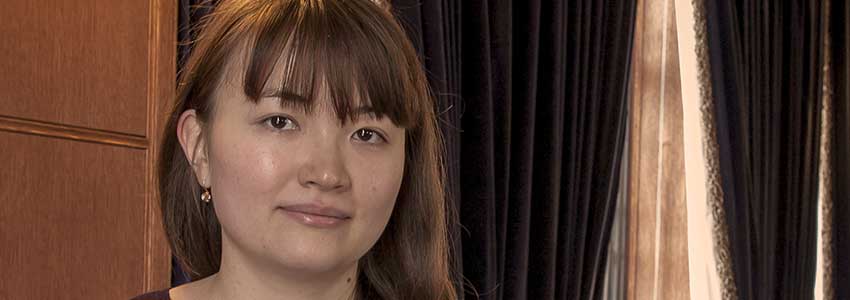Zhibek had a very mathematical childhood. Born in Kazakhstan to parents who both studied physics in college, she was interested in math from an early age. “It was a big part of our family. We spent some of our free time together solving problems,” she recalls.
In her home country, you choose your major before beginning college, and she wasn’t sure she wanted to study mathematics, but thought that with a math background, “I can do basically anything. In Kazakhstan, mathematicians mostly focus on analysis, but I wanted to study algebra. To do so at the graduate level, I needed to go elsewhere.”
So she came to U-M, and Ann Arbor quickly became her home away from home. She says, “The more I travel in the U.S., the more I love Ann Arbor. For a small city, it provides a lot of opportunities, activities and events, and is particularly easy to navigate without a car.”
When asked what she does for fun, she responds, “I like working. I have great friends in the math department. There are a lot of international students. We work together, hang out and cook for each other, sharing each other’s cultures. We share such a core common experience as international students, it is easy to bond with them.”
Zhibek’s dissertation research focuses on commutative algebra, particularly solving problems related to commutative rings. A commutative ring is an abstract object which resembles the integers and their properties. One of the main goals of commutative algebra is to study rings' properties and to understand their ideals. Different methods and concepts have been developed and new theories have been born as a result. However, tight closure theory has proved to be one of the most powerful tools in modern commutative algebra, providing proofs for questions that had been open for quite a long time and simplifying the existing ones. She explains, “My research focuses on one particular aspect: the tight closure of ideals and the related theory.”
In reflecting on her graduate studies, she says, “I have learned a lot since I started the PhD program at the University of Michigan. Part of my time I have devoted to teaching and the other part to studying. That is what I love about mathematics: you learn and you share what you have learned, and in the end you learn even more. However, teaching is a time consuming and mentally exhausting process. Doing research also requires a lot of mental resources. Especially now, when I have to learn a lot, it is important to dedicate as much time and effort to it as possible. It is the period when I can build the foundation for my future research career. And I want it to be strong.”
She continues, “I look at teaching like rivers flowing into and out of a lake. You get knowledge from someone else and pass it to others as well. This is the most productive part of math for me. I learn more when I prepare a lesson plan and help explain concepts to others.”
Funding has been an essential part to her graduate journey. “Receiving a Barbour Fellowship is giving me an opportunity to strengthen my research skills and build a solid background in commutative algebra, which I will later use to bring positive changes to the educational system of my home country of Kazakhstan,” she plans. “I’ll be sad to leave here. This is such a great city and University. I’ve been here for four years and they’ve been the most productive of my life. This experience has helped open my mind. I’ve really grown as a person.”

